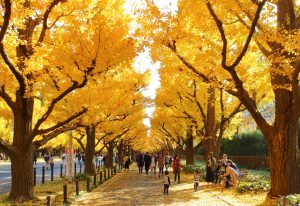The “Empress of Tree-Cutting” (伐採女帝) is a catchy, provocative, and derisive nickname recently conferred to Tokyo Governor Koike Yuriko. The intent is to challenge and call attention to her perceived indifference toward calls to cease a large construction project at Jingu Gaien in central Tokyo. The proposed “redevelopment” project would raze and replace the 100-year-old Meiji Jingu baseball stadium and the Prince Chichibu Memorial rugby ground while also felling potentially 1,000 or more of the mature Ginko trees that fill the area.
Opposition to this proposed project has been vocal, amplified by the fame of novelist Murakami Haruki and the late composer Sakamoto Ryuichi, whose dying plea was to cease the project and protect the iconic trees. Many opponents have pointed to Koike’s plans and statements on the need for a greener Tokyo, and the hypocrisy of making such claims while overseeing efforts to destroy a frequently visited and beloved green space in a city too often bereft of such areas. Others have invoked tradition, noting that particularly Meiji Jingu stadium is a site of historical significance; it’s the field Babe Ruth played on when he and his American teammates toured Japan in 1934. Still other critics have pointed out that the governor is a well-known supporter of Japan’s powerful construction lobby, claiming this latest project is but another example of putting those monied interests before the desires of the public she purportedly serves.
All of these are, in my view, valid points of criticism. Like other opposition voices I am saddened and frustrated by a looming future where the Yakult Swallows play their baseball in a different, likely sterile and costly, stadium. Or where a leafy, shaded, and ideal jogging path in a city with a scarcity of such luxuries is transformed unnecessarily into something that better serves the developers behind the project instead of the people who populate the city.
But I also wonder where the outcry was in December 2022, when Mitake Park in Shibuya was closed for a similar “redevelopment” project and the homeless residents were violently evicted. Indeed, they were evicted with such haste and questionably legality that one man was trapped inside the park.
Certainly, there was some opposition. Volunteer organizations like Shibuya’s Nojiren pushed back and delayed Mitake’s closure for a few months. House of Councilors member and former actor Yamamoto Taro visited the site and demanded to speak with official from the Shibuya Ward government. But little else came of this, and by late December the park was closed and the former residents displaced.
These two divergent example speak to a concerning absence of principles, the foundational tenets organizing a system of beliefs and practices, and the invested outcomes that should follow. Is opposition to the Jingu Gaien project rooted in a need for the public to assert a voice, demand transparent democratic representation, and protect a piece of public space for all to enjoy? If so, where was the outcry when Mitake Park was closed? Or when Miyashita Park was closed in 2017 and transformed into a shopping mall, with marginal and typically fee-based “park” facilities on the roof? Far too many pieces of public space across Tokyo have slipped quietly into private hands, facilitated with seductive redevelopment exteriors that mask the erosion of civic possibility and the imposition of exclusionary practices.
Jingu Gaien’s gorgeous trees, the iconic Meiji Jingu stadium, and the pleas from the public to preserve these historic and beautiful pieces of Tokyo are profoundly important. They should be heeded, and the possibility that they will be ignored is deeply concerning. It speaks to a larger absence of representation and democratic process across Japan, to the too frequently unchecked power of the construction and real estate industries, and the willingness of Koike to indulge and perpetuate an autocratic system.
But the outcry around this specific project also betrays an absence of broader principles that demand protection of public space, the vulnerable, and aspiration to a fair, equitable, and transparent social order. Jingu Gaien has generated a striking level of opposition and engagement. But other projects that operate with similar intentions – tearing down the old, placating the public with new consumerist spaces, and in doing so fostering a more exclusionary and unequal Tokyo – have not. A reckoning with this damning absence of principles is needed.
I fear the movement to Save Jingu Gaien will fail (but I hope to be wrong). Not because it is unworthy or disorganized, but because a piecemeal approach where motivation is spurred by self-serving interests is a fragile mechanism upon which to construct an opposition to something as powerful as the interests of the governor and her corporate backers.
This recognition is also deeply saddening, as it comes with a realization that I have likely already watched the Swallows in their true home or walked the Ginko-lined paths exploding with autumn colors for the last time. But those disappointments are insignificant when compared with the larger structural realities: that far too many did not care enough to speak out when Tokyo’s most marginal were attacked, harassed, and displaced. Jingu Gaien is not the first but just the latest in a growing list of projects more invested in fostering consumerism and facilitating exclusion than building an equitable society. In our collective indifference, the foundation was laid for a contemporary Tokyo where even the voices of the famous and influential struggle to stop the destruction of the beautiful and historic when it serves the interests of the monied and powerful.

































